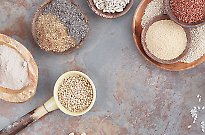
8 ways to manage food intolerances

Learn to look after your body
Penny Lara looks at how to cope with common intolerances
1. Consult a health professional.
To identify the problem food, avoid unnecessary diet restrictions, and to ensure nutrient adequacy consult an accredited dietitian.
2. Check food labels
The ingredients are listed in order of quantity from largest to smallest, so steer clear if an ingredient is named early in the list.
3. Learn your limits
If you can tolerate small amounts, you might be able to add a little at a time to learn how much your body can take.
4. Allow yourself guilt-free eating
“For special days like Christmas and New Year's Day, people can choose to eat more freely,” says dietitian Zoe Nicholson.
5. Enjoy eating out.
Nicholson says by limiting your problem foods day to day, you can get away with eating out more freely, if not too often.
6. Use natural moisturiser
If you suffer from eczema, avoid hot showers and use a natural moisturiser like virgin pressed coconut oil to avoid drying out the skin
7. Increase psyllium intake
Increasing fibre is recommended in the treatment of IBS, but one study revealed the key was increasing soluble fibres such as psyllium, as opposed to insoluble fibres like bran.
8. Confirm diagnosis
If one of these intolerances has been diagnosed using cytotoxic food testing, Vega testing, IgG antibody testing, kinesiology, iridology, pulse testing or Alcat testing, the Australian Society of Clinical Immunology and Allergy suggests confirming the diagnosis using conventional methods, as alternative methods have at times been unclear.
Next: Find out how to manage gluten intolerance or browse more health articles.
Photo credit: Thinkstock


